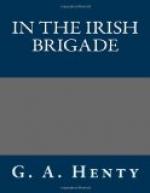“I have seen enough of the consequences of drink in Ireland,” Desmond said, “to cure me of any desire for liquor, even had I a love for it. Faction fights, involving the people of the whole barony, arising from some drunken brawl, are common enough; while among the better class duels are common and, for the most part, are the result of some foolish quarrel between two men heated by wine. Besides, even putting that aside, I should have given up the habit. When I joined the regiment, I was anxious to become a good swordsman, but if one’s head is overheated at night, one’s hand would be unsteady and one’s nerves shaken in the morning.
“Possibly,” he added, with a smile, “it is this, quite as much as the hotness of their temper, that prevents the best teachers from caring to undertake the tuition of the officers of the Brigade.”
“Possibly,” Phelim laughed, “though I never thought of it before. There is no doubt that the French, who, whatever their faults be, are far less given to exceeding a fair allowance of wine than are our countrymen, would come to their morning lessons in the saloon in a better condition to profit by the advice of the master than many of our men.”
“I don’t think,” Patrick O’Neil said, “that we Irishmen drink from any particular love of liquor, but from good fellowship and joviality. One can hardly imagine a party of French nobles inflaming themselves with wine, and singing, as our fellows do. Frenchmen are gay in what I may call a feeble way—there is no go in it. There is no spirit in their songs, there is no real heartiness in their joviality, and the idea of one man playing a practical joke upon another, the latter taking it in good part, could never enter their heads, for they are ready to take offence at the merest trifle.
“As you know, there are certain cabarets told off for the use of the soldiers of the Brigade. They are allowed to use no others, and no French troops are allowed to enter these wine shops. Similarly, there are certain establishments which are almost exclusively patronized by officers of the Brigade. There is, of course, no absolute rule here, and we can enter any cabaret we choose; but it is understood that it is at our own risk, and that, if we get into trouble there, we are sure to be handled over the coals pretty sharply, as it is considered that we must deliberately have gone there with the intention of picking a quarrel. The cabarets used by the men are all close to the barracks, so that, in case of a fracas, a guard is sent down to bring all concerned in it back to the barracks. Fortunately, there is no need for the places we frequent being so close to the barracks, for it is understood that anyone who takes too much liquor, outside his own quarters, brings discredit on the regiment; and it is after we adjourn to the rooms of one or other of us that liquor begins to flow freely, and we make a night of it.”
“Don’t you ever have quarrels among yourselves?”




